Smart Sustainability: Leveraging AI to Engage and Innovate Classes
This session will explore innovative methods for teaching sustainability to college and graduate students, emphasizing the integration of artificial intelligence (AI) to enhance learning and problem-solving. Featured speakers include Namchul Shin from CSIS, who researches company transparency on sustainability using LLMs, and Canan Corus and Burcin Col, who teach sustainability courses and engage in research in the field.
Center for Sustainable Business co-hosted the Lubin Research Seminar Series Spring 2025. The event was held on Wednesday, February 19, 2025, featuring Burcin Col, Associate Professor of Finance and Kaustav Sen, Professor of Accounting at Lubin School of Business, Pace University.
Dr. Col and Dr. Sen delivered a presentation titled "Environmental and Social Convergence Through Cross-border Acquisitions: Evidence from Emerging Market Multinationals."
Friends of Women in Finance Symposium-Greater New York (FWFS-GNY)
2024 Renewable Energy Conference
Monday, June 24, 2024–Tuesday, June 25, 2024
The Lubin School of Business, in partnership with The Business Council of New York State, Inc.and The Hudson Renewable Energy Institute, is pleased to share that the 2024 Renewable Energy Conference was again held at Pace University's Pleasantville Campus. The Renewable Energy Conference annually gathers experts to address the state's efforts to expand renewable energy generation, and related issues impacting the state's electric market and overall economy. It features sessions analyzing how state policy affects the competitive electric market, influences the development of renewable sources, and explores the role of renewable energy in achieving the emission reduction mandates of the CLCPA. Importantly, the Conference also evaluates current and developing state policies for the effectiveness and costs and looks at alternative implementation strategies. Hosted at Pace University in Westchester, the conference provides an exciting venue for learning, networking, and addressing crucial issues for individuals, organizations, and businesses.
2024 Renewable Energy Conference Gallery

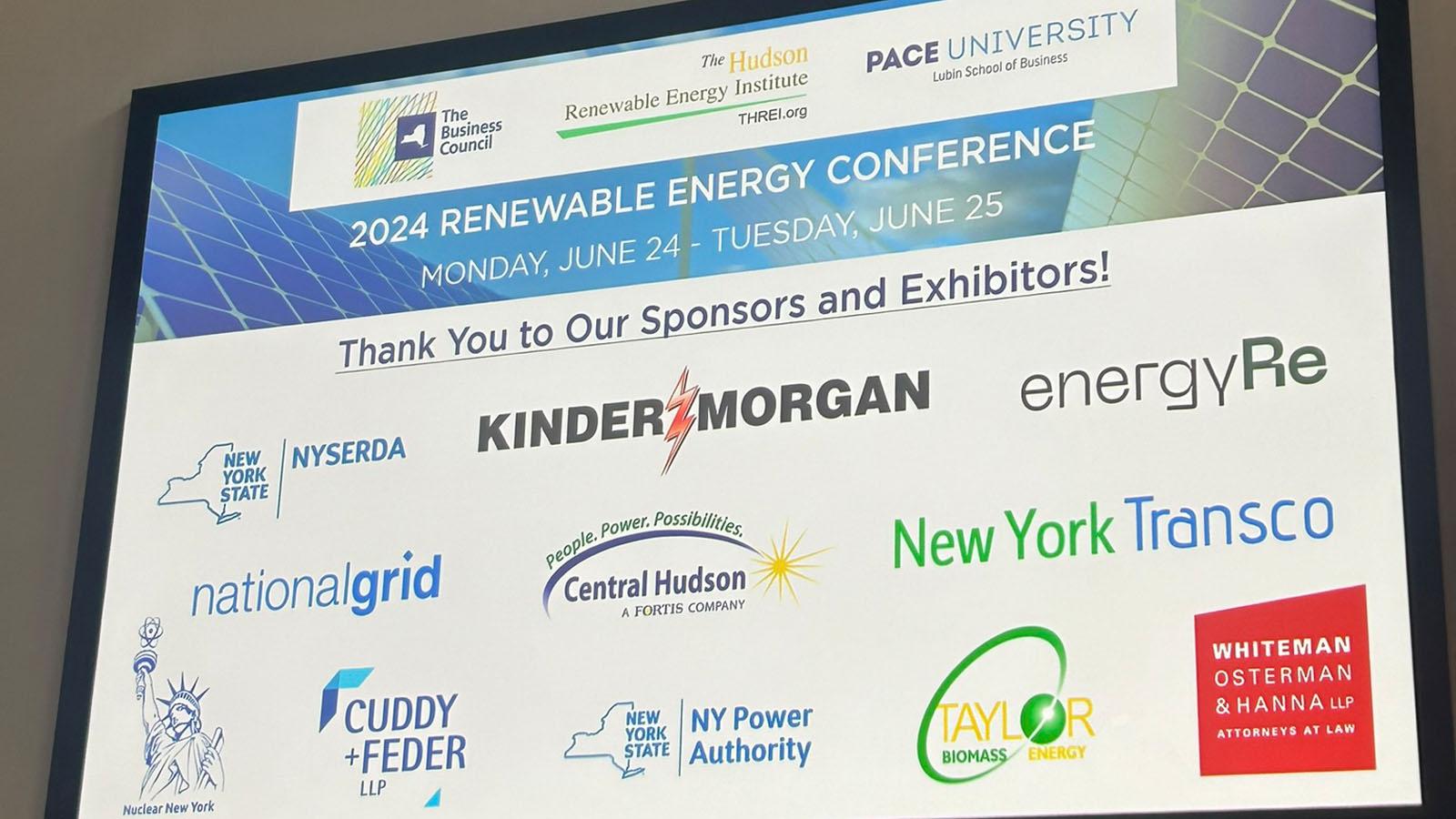
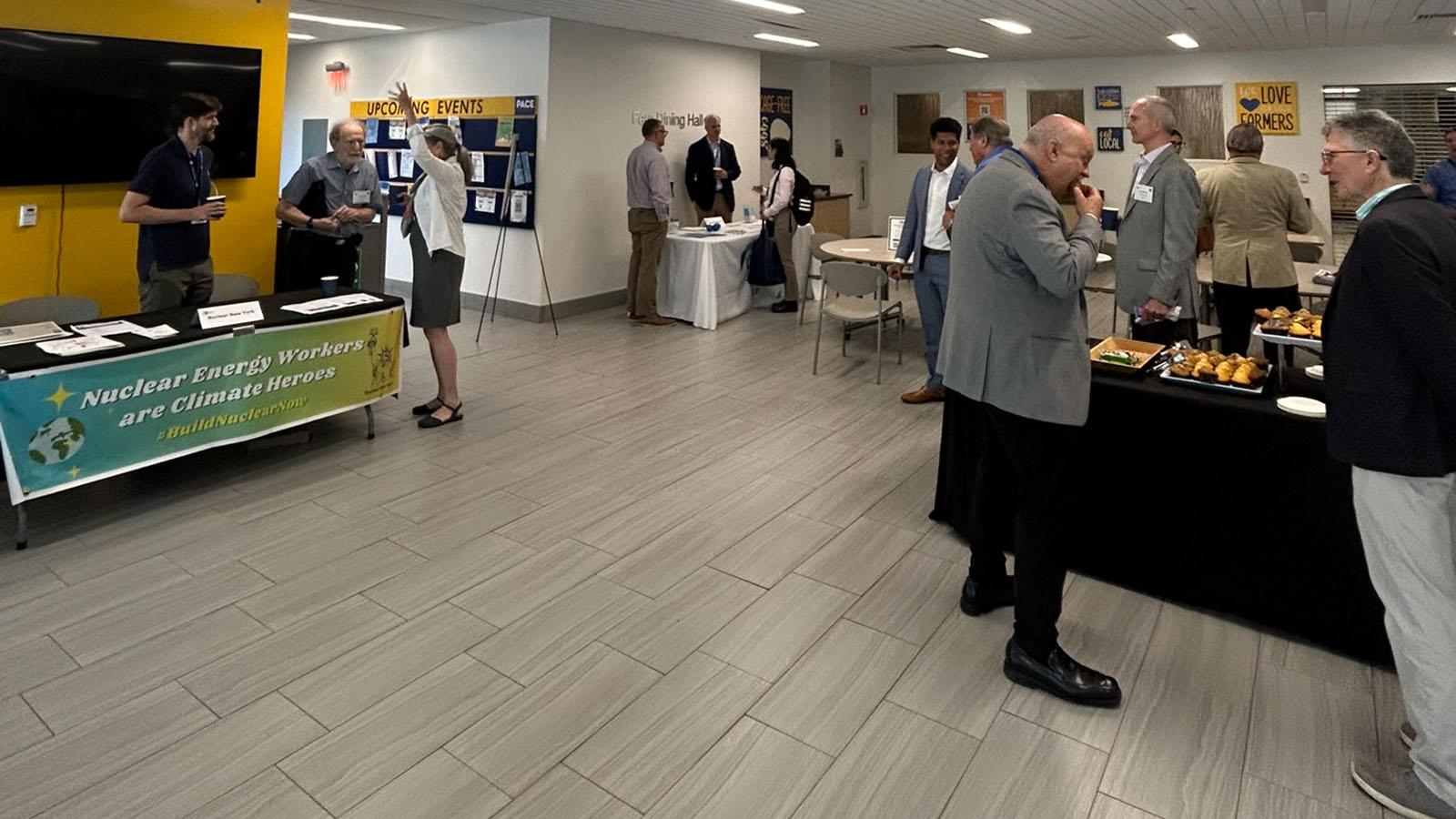
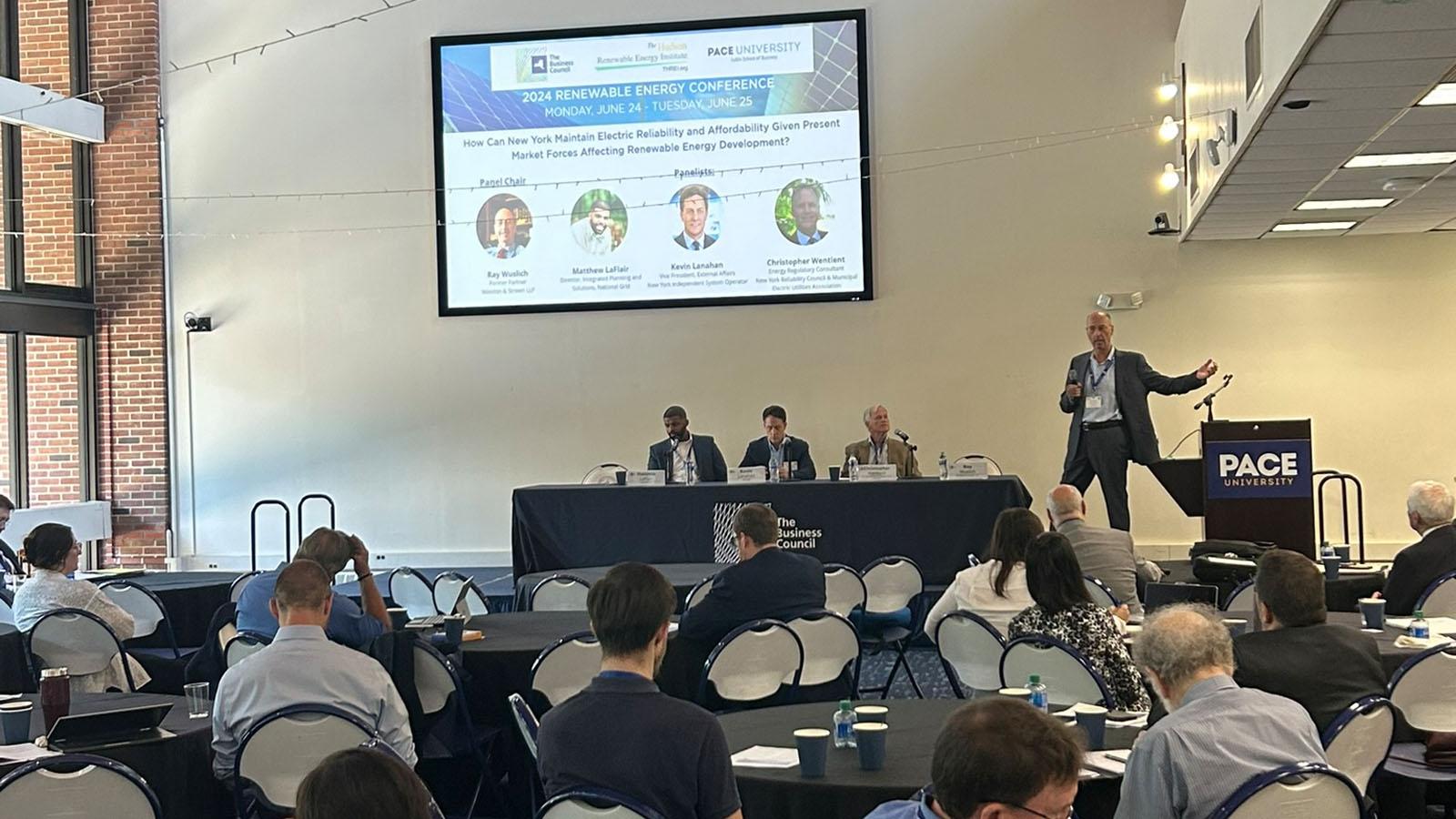
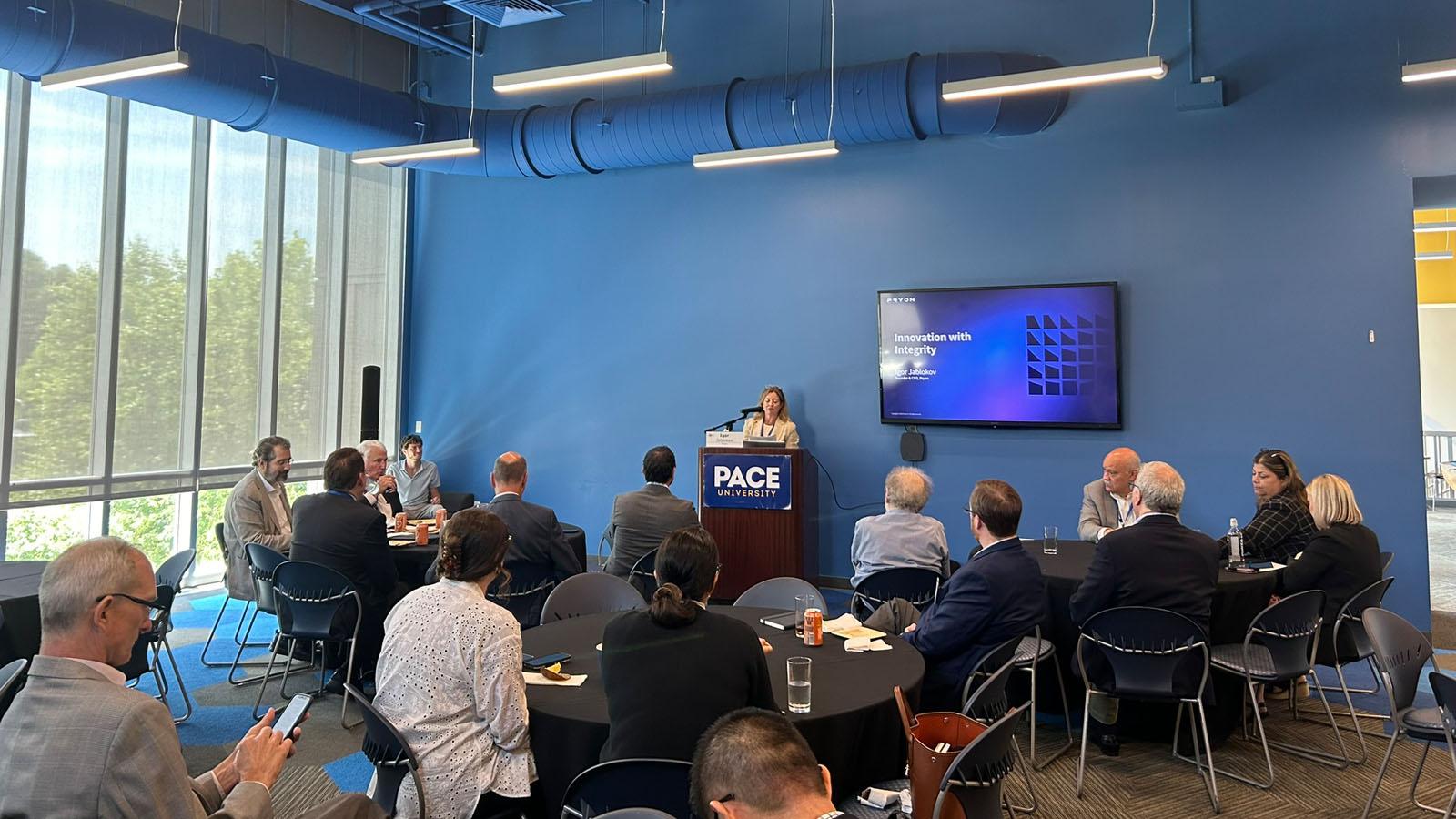
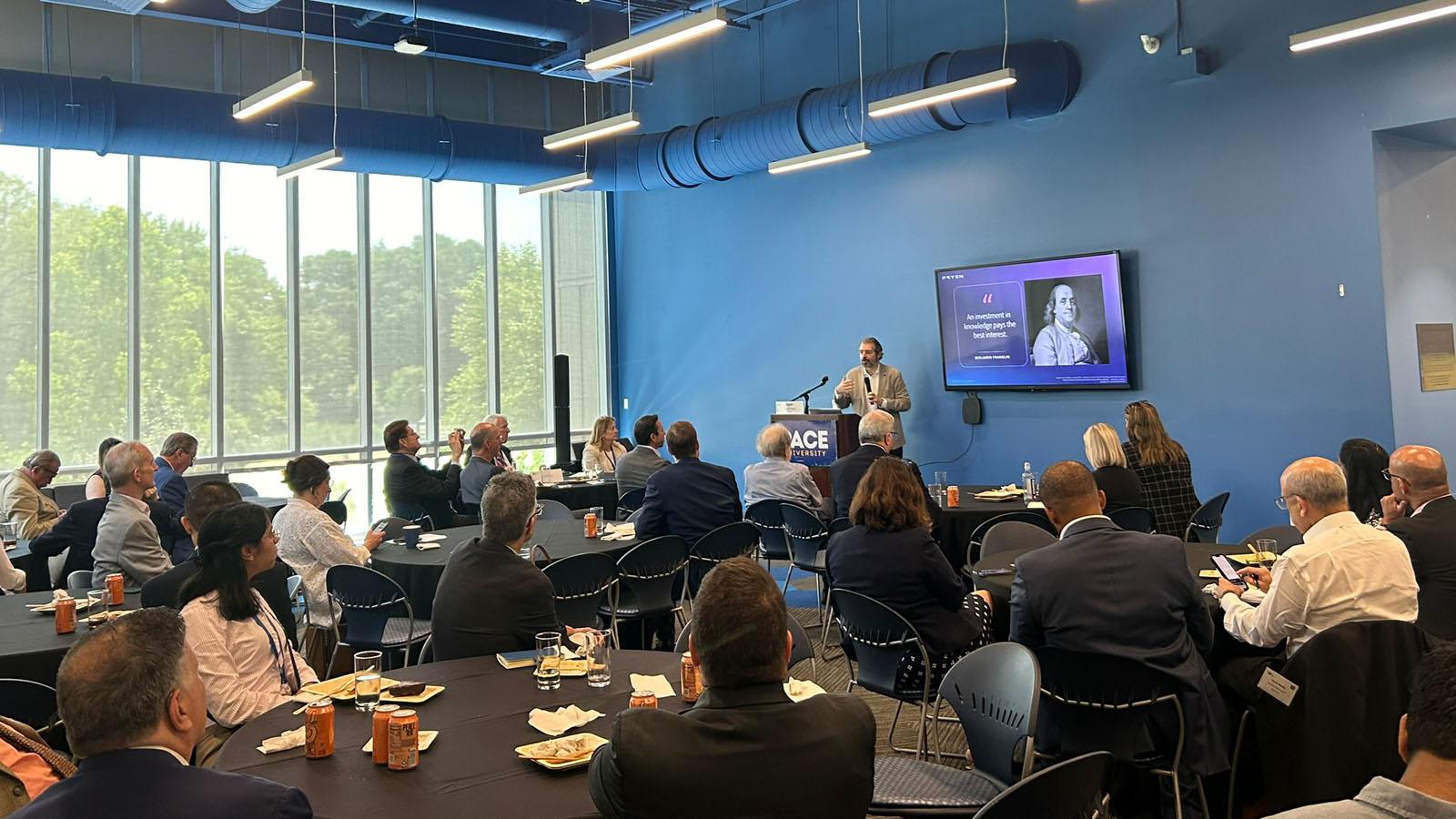
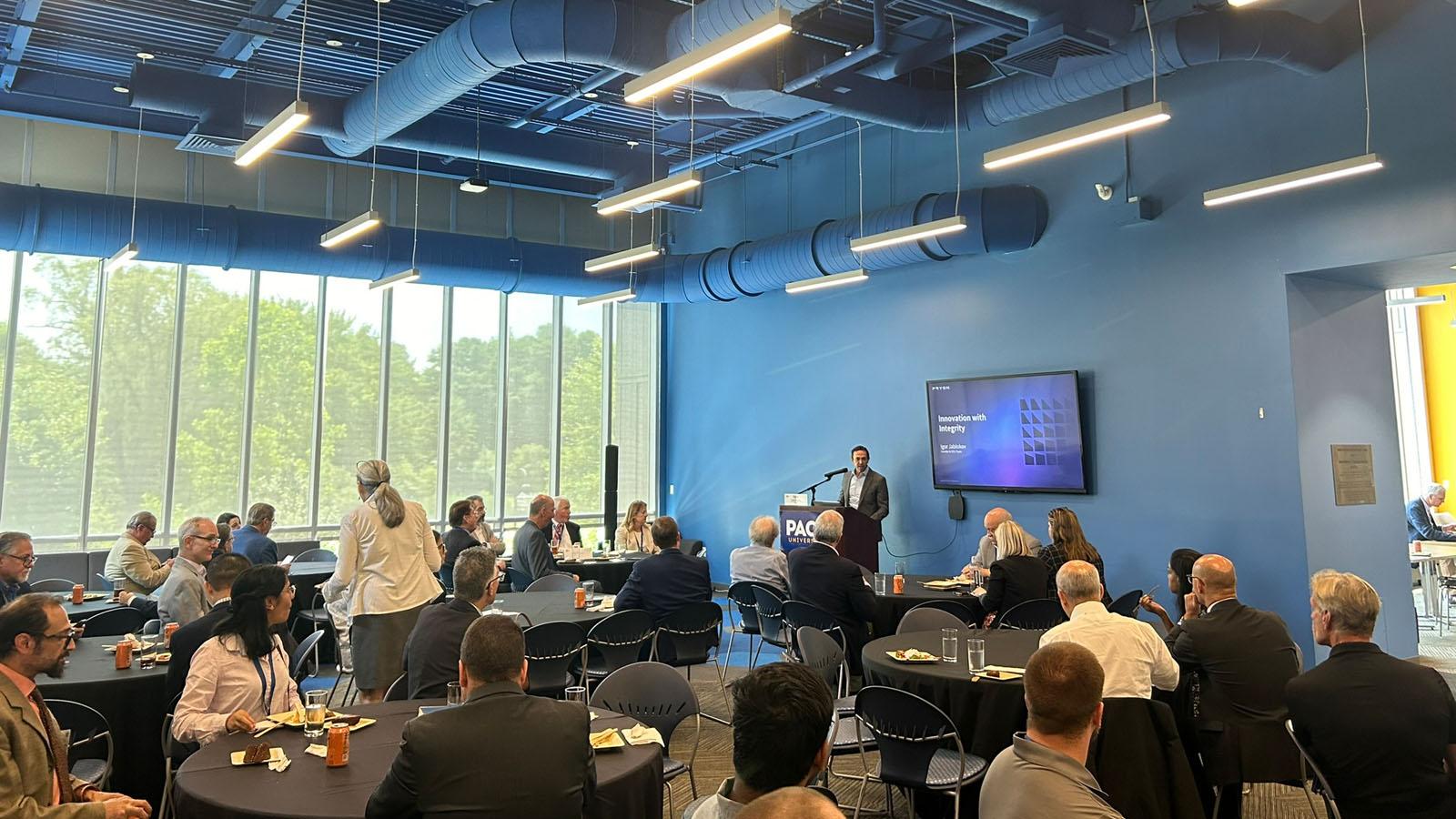
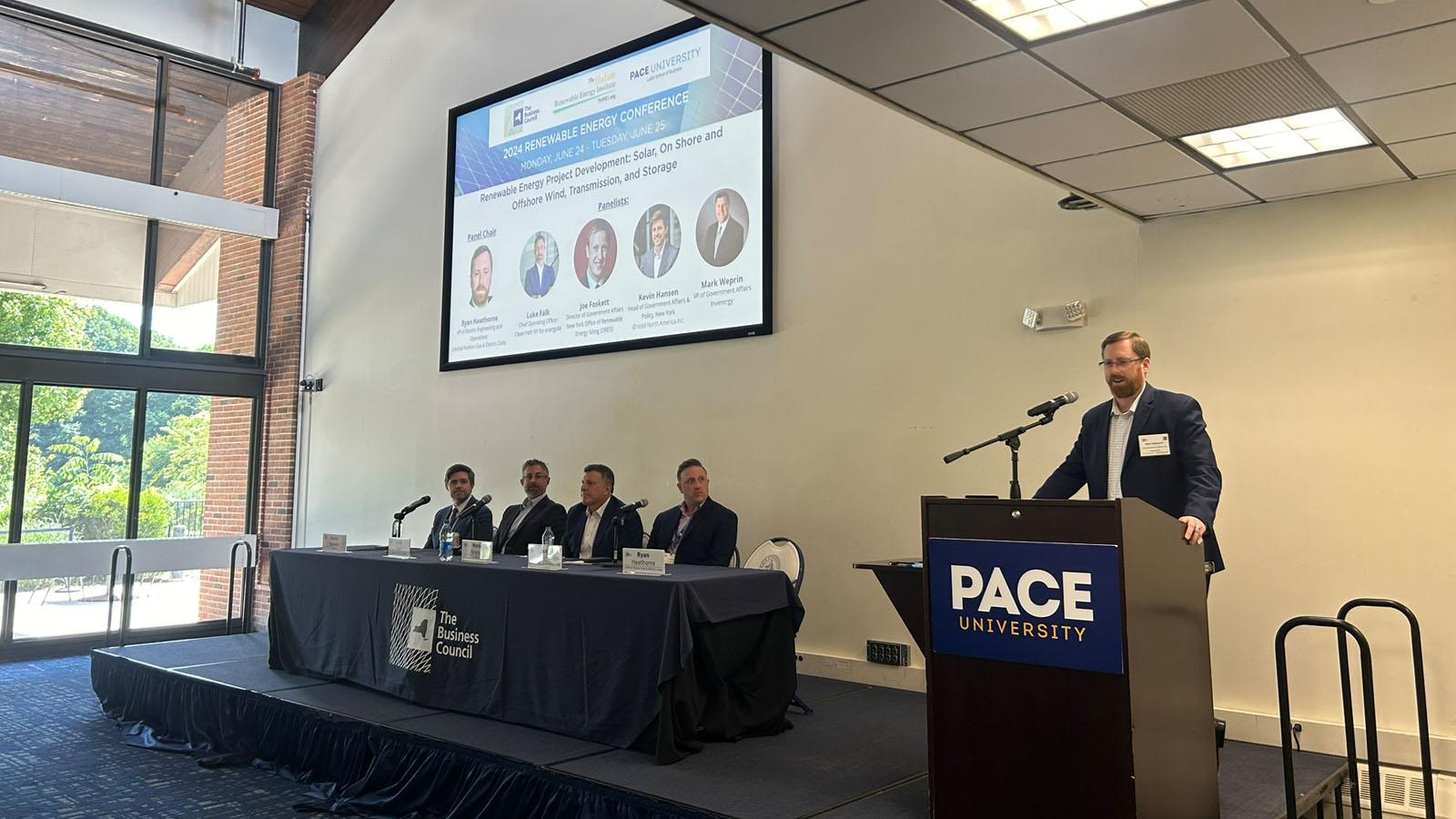
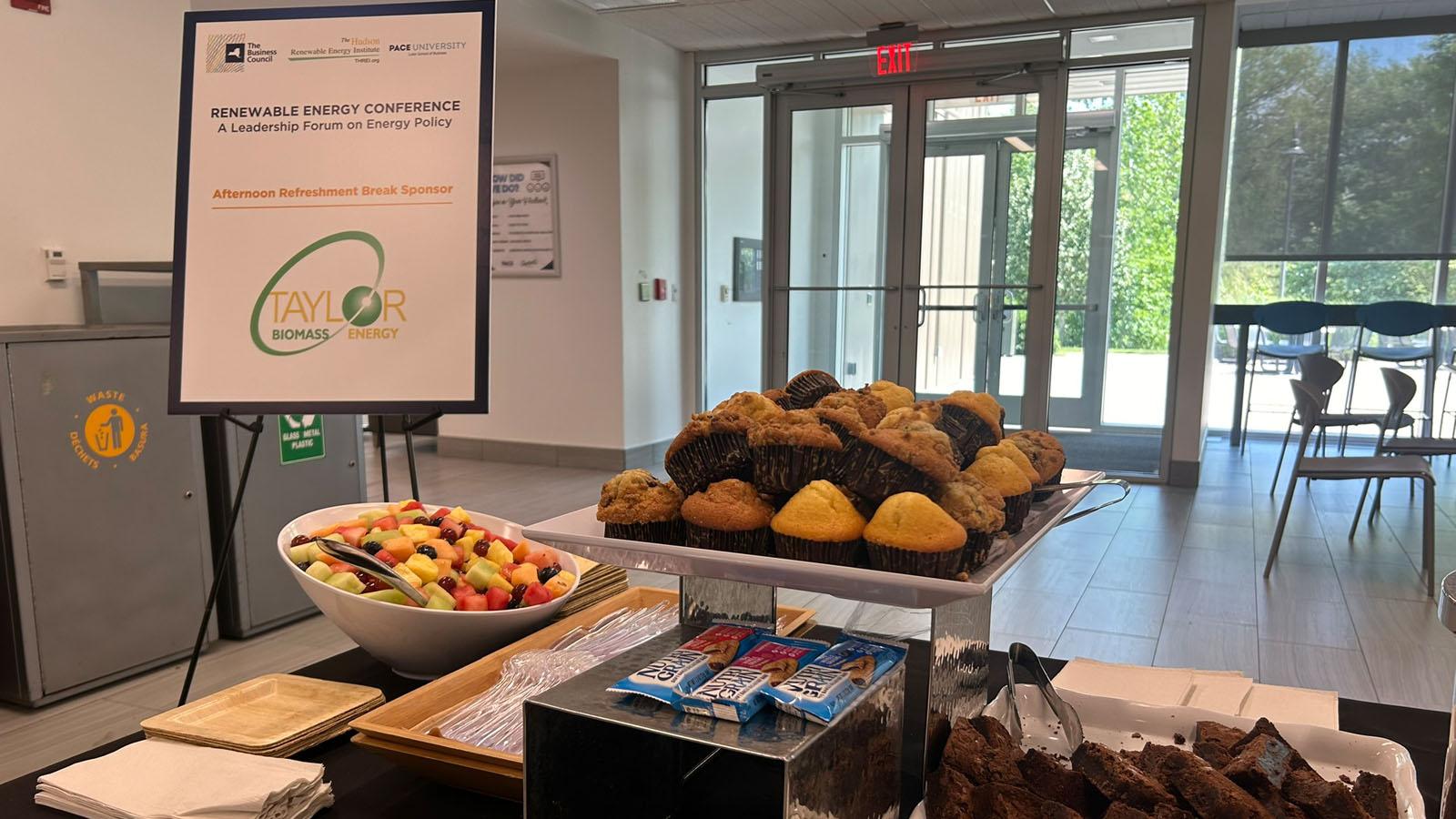
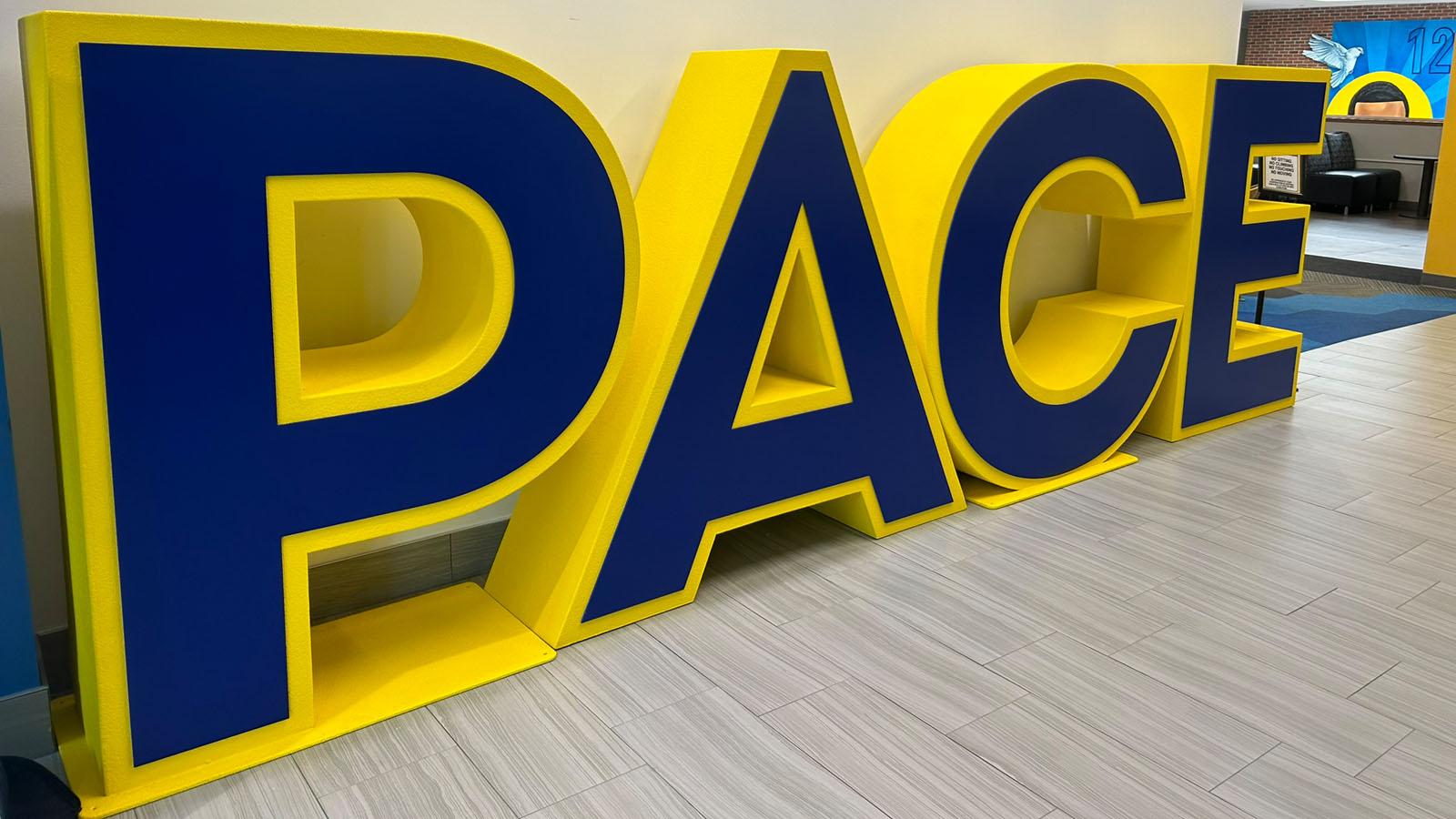
We kicked off the 2024 Renewable Energy Conference with a Welcome Reception on Monday night.
Thank you to our sponsors and exhibitors for the support! Kinder Morgan, NYSERDA, energyRe, National Grid, Central Hudson Gas & Electric Corp., New York Transco, Taylor Biomass Energy, Whiteman, Osterman & Hanna LLP, Nuclear New York, Cuddy & Feder LLP, and the New York Power Authority
Attendees started the morning off by visiting the exhibitors: Cuddy & Feder LLP, Nuclear New York, and the New York Power Authority.
Morning sessions covered New York's electric future, global innovations, and strategies to maintain reliability and affordability amid renewable energy market shifts.
Heather Mulligan, President and CEO of The Business Council of New York State, delivered welcome remarks at lunch.
Igor Jablokov, CEO and Founder of Pryon, gave the luncheon address on "The Role of AI in Meeting Future Renewable Energy Goals in New York and Beyond."
Allen Fore, Vice President of Public Affairs from Kinder Morgan Inc. delivered welcome remarks at lunch. Thank you to Kinder Morgan for being the premier sponsor of the Renewable Energy Conference.
Afternoon sessions continued with various panels: making the rollout of the CLCPA scoping plan work, renewable energy project development and discussing what's next in this field.
Refreshment breaks throughout the conference were generously provided by the sponsors.
Thank you to Pace University for partnering with The Business Council of New York State and The Hudson Renewable Energy Institute on another successful conference.
2023 Climate Week Event
Wednesday, September 20, 2023, 12:00 p.m.–1:00 p.m. EST
As part of Climate Week 2023, the Center for Sustainable Business facilitated a 60-minute virtual and interactive session, "How a Sustainable Mindset Contributes to Sustainable Living." Topics included:
- What does a mindset for sustainability look like? A sustainability mindset expands our awareness and intentions, leading to actions that create more sustainable living. Understanding our mindset helps us identify how we create and promote positive, sustainable living choices or allow unsustainable choices.
- How can we develop a sustainable mindset to create sustainable living and lifestyles, individually and collectively? Sustainable living means understanding how our lifestyle choices impact the world and finding ways to improve sustainable living choices. The theme of sustainable living is part of the UN Sustainable Development Goal (SDG) number 4, Education, and SDG number 12.8, Responsible Consumption.
Facilitators:
- Dr. Isabel Rimanoczy, author and convener of the United Nations (UN) PRME Working Group on the Sustainability Mindset
- Steven Mezzio, PhD, CPA, former Partner at PwC, founder, executive director of the Center for Sustainable Business at Pace University, and UN-PRME Sustainability Mindset group member
2023 Renewable Energy Conference
Tuesday, June 20, 2023 and Wednesday, June 21, 2023
The Lubin School co-hosted the 2023 Renewable Energy Conference: A Leadership Forum on Energy Policy with The Business Council of New York State, Inc. and The Hudson Renewable Energy Institute. The event was held on the Pleasantville Campus. The aspirational goals established by the Climate Leadership and Community Protection Act (CLCPA) have set New York on a path to green energy, but they aren't without significant challenges for businesses and consumers. It's time to explore how New York plans on achieving 70% renewable energy by 2030, a fully decarbonized electric generating sector by 2040, and state-wide net-zero emissions by 2050. The conference focused on the work of the Climate Action Council established under the CLCPA to implement the Act's mandates. Panels explored the ambitious goals for the development and deployment of offshore wind and solar resources, the reduction in fossil generation, and adding energy storage. How business, resident, and customer requirements will be impacted by CLCPA program roll outs was investigated by a panels of experts.
2022 Renewable Energy Conference
Tuesday, June 21, 2022 and Wednesday, June 22, 2022
The Lubin School co-hosted the 2022 Renewable Energy Conference: A Leadership Forum on Energy Policy with The Business Council of New York State, Inc. and The Hudson Renewable Energy Institute. The aspirational goals established by the Climate Leadership and Community Protection Act (CLCPA) have set New York on a path to green energy. The conference focused on the work of the Climate Action Council established under the CLCPA to implement the Act's mandates. Panels explored the ambitious goals for the development and deployment of offshore wind and solar resources, the reduction in fossil generation, and adding energy storage. How business, resident, and customer requirements will be impacted by CLCPA program rollouts was also investigated by a panels of leading voices in the fields of energy, transportation, technology, academia, government policy, and business.
2021 Annual Meeting of the American Accounting Association (AAA) - The 25th Annual Ethics Research Symposium
The Future of the Accounting Profession: Regaining the Public Trust
Friday, July 30, 2021
Moderator
Bill Miller, Professor, University of Wisconsin at Eau Claire
Topics and Panelists
Corporate Governance: The Forgotten G Factor in ESG
Steven Mezzio, Executive Director Lubin Center for Sustainable Business, and Professor, Accounting, Pace University
Corporate Governance is the G in ESG, a core component of environmental, social and governance practices that should serve the public interest. Steve will address the G factor and its relationship to ethical decision-making in the context of organizational management, accountability and public trust implications that go beyond shareholder value to encompass a broader notion of key stakeholder value.
The Auditor as Whistleblower
Francine McKenna, Independent Journalist, Adjunct Professor of Management at the American University
Whistleblowers have been in the news, and everyone knows about how the Sarbanes-Oxley Act and the Dodd Frank-Act's protections for regular whistleblowers promote the public interest and financial reporting integrity. But what are the special requirements and constraints for whistleblowers who are CPAs and internal or external audit firms. Francine will provide the highlights from the Botta v. PricewaterhouseCoopers LLLP trial this past spring and other cases to raise awareness of the ethical and legal obligations of these whistleblowers and their firms or employers.
Auditing at a Crossroads
Steven Mintz, Professor Emeritus, California Polytechnic State University, San Luis Obispo
The auditing profession is under attack for its failure to conduct independent audits and lapses in exercising professional skepticism that raise doubts about whether auditors are protecting the public interest. Audit failures at companies like Wirecard raise a red flag that auditors lack the professional skepticism to conduct an audit in accordance with generally accepted auditing standards. Steve will discuss one suggestion to tighten up audits, which is to operationally split audit and non-audit services to deal with the inherent conflicts of interest when providing both services to clients.
Socially Responsible Accounting - Protecting the Public Interest
Rick Kravitz, Editor in Chief, CPA Journal, Adjunct Faculty, Texas A&M School of Law
Absent an effective gatekeeping profession, no amount of regulation or legislation can protect the public. Rick argues that accountants, as gatekeepers, have an inviolate, unique and historical obligation to protect the public; especially today when multinational corporations are larger and may have more impact on global society than sovereign nations.
2021 Renewable Energy Conference
Tuesday, June 29, 2021 and Wednesday, June 30, 2021
The Lubin Center for Sustainable Business virtually co-hosted the 2021 Renewable Energy Conference: A Leadership Forum on Energy Policy with The Business Council of New York State, Inc. and The Hudson Renewable Energy Institute. The aspirational goals established by the Climate Leadership and Community Protection Act have set New York on a path to green energy, which may pose significant challenges for businesses and consumers. This conference brought together business leaders, environmental experts, and leading voices in the fields of energy, transportation, technology, academia, and government to discuss ways to effectively put New York and its businesses on the right path.
